One Nation One Anganwadi Program
Why in News?
More than 57,000 migrant workers have registered for the special One Nation One Anganwadi programme. This is possible through coordination between the Centre and the State governments by using the Poshan Tracker App on mobile phones.
Anganwadi
- Anganwadis are the centre for early childhood care and education (ECCE). They also provide basic health care facilities in Indian villages. It is a part of the Indian public health-care system.
Integrated Child Development Scheme

The Umbrella ICDS is a centrally sponsored scheme implemented by the Ministry of Women and Child Development. It was launched in 1975.
Anganwadi Services Scheme
- The anganwadi centres, operated under the Integrated Child Development Services scheme are the first contact point in the village for nutrition, health and early learning. They were started by the Indian government in 1975.
- It provides a package of six services namely supplementary nutrition, pre-school non-formal education, nutrition & health education, immunisation, health check-up and referral services.
Pradhan Mantri Matru Vandana Yojana
- It provides cash incentive amounting to Rs.5,000/- in three instalments directly to the Bank/Post Office Account of Pregnant Women and Lactating Mother (PW&LM) in DBT (Direct Benefit Transfer) Mode during pregnancy and lactation in response to individual fulfilling specific conditions.
National Creche Scheme
- It provides day care facilities to children of age group of 6 months to 6 years of working women.
- The facilities are provided for seven and half hours a day for 26 days in a month.
- Children are provided with supplementary nutrition, early childcare education, and health and sleeping facilities.
Scheme for Adolescent Girls
- It aims at out of school girls in the age group 11-14, to empower and improve their social status through nutrition, life skills and home skills.
- The scheme has nutritional and non-nutritional components which include nutrition; iron and folic acid supplementation; health check-up and referral service; nutrition and health education; mainstreaming out of school girls to join formal schooling bridge course/ skill training; life skill education, home management etc,; counselling/ guidance on accessing public services.
Child Protection Scheme
- It aims to contribute to the improvement and well-being of children in difficult circumstances, as well as, reduction of vulnerabilities to situations and actions that lead to abuse, neglect, exploitation, abandonment and separation of children from parents.
POSHAN Abhiyaan
- It targets to reduce the level of stunting, under-nutrition, anaemia and low birth weight babies by reducing mal-nutrition/undernutrition, anaemia among young children as also, focus on adolescent girls, pregnant women and lactating mothers.
Poshan Tracker App
- The Ministry of Women and Child Development (MoWCD) has launched an application called Poshan Tracker.
- This application provides a 360-degree view of the activities of the Anganwadi Centre (child care centers), service deliveries of Anganwadi Workers and complete beneficiary management for pregnant women, lactating mothers and children under six.
- The app facilitates efficient service delivery by digitizing and automating the tasks performed by Anganwadi Workers.
- To support their work, smartphones procured through Government e-Market (GeM) have been provided to the workers.
- Migrant workers who have registered in their original state can visit the nearest Anganwadi in their current place of residence to access the schemes and services provided through the app.
National Cooperative Consumers Federation of India (NCCF)
Magicpin, a hyperlocal e-commerce business, recently began selling tomatoes for Rs. 70 per kilogram through a few online platforms listed on the government-backed ONDC after signing an agreement with NCCF.
About
- It was established on 16th October 1965 to function as the apex body of consumer cooperatives in the country.
- It is an organization to promote consumer cooperative movement in the country, aspires to facilitate the voluntary formation and democratic functioning of cooperatives, based on self-reliance and mutual aid for overall economic betterment and financial autonomy.
- It is registered under the Multi-State Co-operative Societies Act, 2002.
- NCCF functions under the Ministry of Consumer Affairs, Food and Public Distribution, Government of India.
- Headquarters: New Delhi
- Structure:
- The management of NCCF vests in the Board of Directors.
- The ultimate authority of NCCF vests in the hands of the General Body.
- Board of Directors exercises all the powers of NCCF except those reserved for General Body.
- The current sanctioned strength of the Board of Directors is 21.
What is Open Network for Digital Commerce (ONDC)?
- It is an open-source network set up to enable buyers and sellers to transact with each other irrespective of the e-commerce platform on which either of them is registered.
- It will enable local commerce across segments, such as mobility, grocery, food order and delivery, hotel booking and travel, among others, to be discovered and engaged by any network-enabled application.
- It is an initiative of the Department for Promotion of Industry and Internal Trade (DPIIT) under the Ministry of Commerce and Industry.
- It comprises buyer-side apps where consumers can place orders, seller-side apps that onboard merchants and display their listings, and logistics platforms that handle deliveries.
- Benefits:
- It offers small retailers an opportunity to provide their services and goods to buyers across the country through an e-commerce system.
- ONDC enables merchants to save their data to build credit history and reach consumers.
- It is expected to digitise the entire value chain, promote the inclusion of suppliers, derive efficiencies in logistics and enhance value for consumers.
- ONDC protocols would standardize operations like cataloguing, inventory management, order management and order fulfilment
